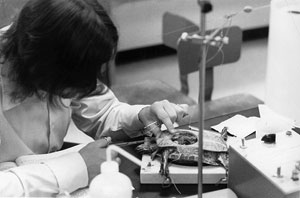Animal Physiologist
Tasks & duties

Animal physiologists may do some or all of the following:
-
conduct experiments on how animal and human cells, tissues and organs work
-
study the body's reactions to factors such as high altitude, diving, exercise and disease
-
measure changes in body functions such as breathing rates and blood pressure
-
measure the effects of nerve signals and hormones on the body
-
use measurements to test theories
-
write reports on the results of the studies being conducted
-
present talks at conferences
-
teach physiology
-
work with and study animals, including marine and freshwater species
-
work with doctors or vets to find cures for diseases
-
work with pharmaceutical companies to develop new drugs
-
test new drugs to assess their effectiveness and suitability for use in New Zealand
Skills & knowledge

Animal physiologists need to have:
-
knowledge of human and animal cells, tissues and organs
-
knowledge of the nerves, hormones and chemical processes that occur within the body
-
understanding of various drugs and their effects on the body
-
understanding of the functions of the brain
-
skill in analysing and interpreting research results and other information
-
practical skills for performing experiments and operating scientific equipment
-
an eye for detail in carrying out and analysing the results of their work
-
planning and organisational skills
-
writing skills, for writing reports and articles for publications
-
maths and computer skills
-
public speaking skills, and the ability to give presentations
Entry requirements
To become an animal physiologist you need to have a Bachelor of Science in physiology, biochemistry or molecular biology.
Secondary education
A tertiary entrance qualification is required to enter tertiary training. However, an A or B Bursary or NCEA equivalent is preferred. Useful subjects include English, biology, chemistry, maths and physics.
Training on the job
Many practical skills are gained on the job, and animal physiologists may attend seminars and conferences to learn about new developments.
Useful experience
Useful experience for animal physiologists includes work as a laboratory technician and work with animals.
Related courses
Biochemistry and Cell Biology
Laboratory Technology
Microbiology
Veterinary Science
Document Actions
